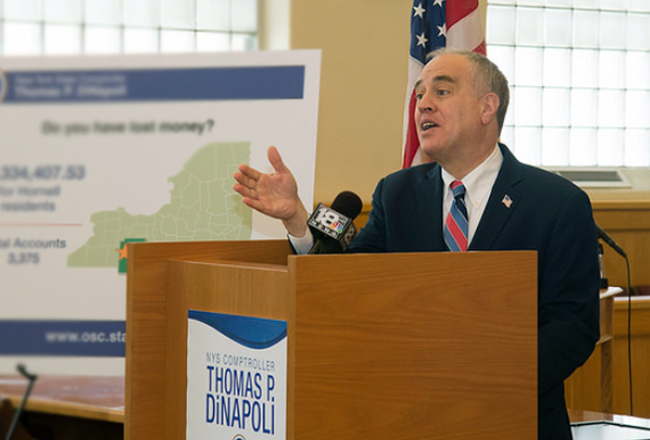Wall Street reversed a three-year trend of declining profits last year, according to Thomas P. DiNapoli, the state comptroller, increasing by 21 percent to $17.3 billion.
The securities industry is on pace this year to beat last year”™s numbers. During the first half of 2017, industry profits totaled $12.3 billion, one-third higher than the $9.3 billion posted in the same period in 2016.
“When Wall Street does well,” DiNapoli said in a news release, “state and city tax collections benefit.”

The securities industry paid New York state $13.5 billion in the past fiscal year, contributing 18 percent of state tax revenues.
DiNapoli attributed the strong performance to cost cutting and to declining legal costs stemming from the financial crisis.
The report measures Wall Street success by the pretax profits of broker-dealers who trade on the New York Stock Exchange. About 130 firms operate on the exchange, down from more than 200 before the crisis.
Industry profits plummeted during the recession in 2007 and 2008. While the securities business is smaller today than before the financial crisis, it remains as one of New York”™s most powerful economic engines, the report says.
Profits from trading represents a smaller share of total revenue, but firms have made gains from other sources, such as account supervision and wealth management.
Wall Street lost about 22,600 jobs from 2007 to 2008. It has added 11,100 jobs in three years, raising employment to 177,000.
The entire region benefits. About 38 percent of the workers live outside of the city, including 6 percent who commute from Westchester County.
The average salary last year was $375,300, including $138,210 in bonuses. That”™s five times greater than the average salary in the rest of the city”™s private sector.
The financial industry is better capitalized and less leveraged than 10 years ago, the report states, due to tougher regulations that have discouraged excessive risk-taking.
DiNapoli cautioned against attempts to boost profits by rolling back financial regulations and consumer protections.
Such efforts, he said, could “put everyday Americans and the broader economy in harm”™s way.”






















